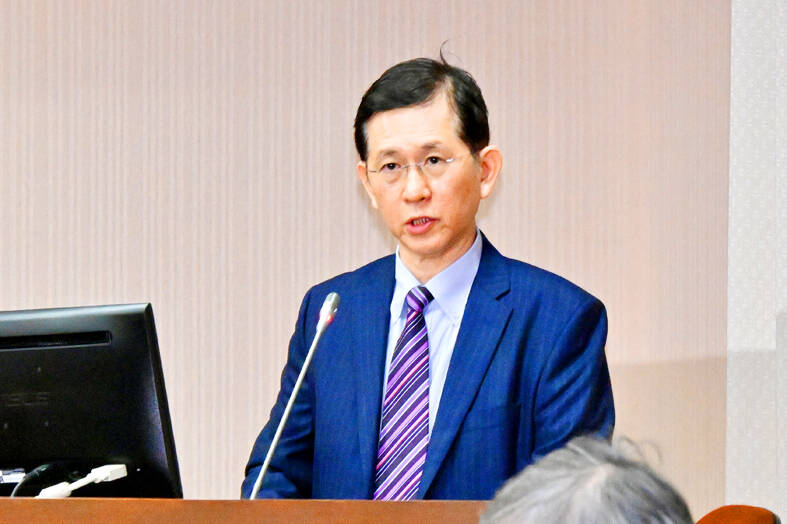From Monday next week, businesses must be registered on telecoms’ “white lists” before they can send text messages containing Web links or phone numbers, the National Communications Commission (NCC) said yesterday.
The measure aims to curb scams through text messages, the commission said.
Article 2 of the Fraud Hazard Prevention Act (詐欺犯罪危害防制條例) authorizes telecoms to improve anti-fraud mechanisms for commercial text messaging.

Photo: George Tsorng, Taipei Times
As of last month, more than 400,000 fraud-related text messages had been distributed this year, NCC data showed.
As a text message can contain no more than 80 Chinese characters, many scammers send targets to Web pages by including links, some of which are shortened to hide their destination, NCC Secretary-General Huang Wen-che (黃文哲) said.
Businesses must from Monday next week apply with telecoms if they want to include Web links and phone numbers in commercial text messages, Huang said.
Once their applications are approved, they must register the links and phone numbers that would be included in their text messages, he said.
Only messages containing those registered links and phone numbers would be distributed, he said.
Businesses must reapply if they want to change the registered information, he added.
The content of all commercial text messages would be subject to scrutiny, and telecoms should not deliver messages that contain unregistered links and phone numbers or come from businesses that have yet to secure approval to send messages, Huang said.
Telecoms should expedite delivery of text messages sent from reliable corporate customers, he said.
As for potential scams committed through text messages sent by individuals, Huang said that while those are protected by the constitutional right of freedom of correspondence, individuals would not be able to send more than 50 text messages per day, and would be subject to criminal penalties if they were found to have used text messages to commit fraud.
In other news, Minister of Digital Affairs Huang Yen-nun (黃彥男) told lawmakers at a meeting of the legislature’s Transportation Committee that starting next year online advertising platforms are to adopt a real-name system to regulate advertisers in order to curb fraud.
The ministry has rolled out a series of supporting measures since the Fraud Hazard Prevention Act entered into force in July. One of them is to require Google, Line, Meta and TikTok to take down fraudulent advertisements within 24 hours after being notified. Advertisers on the platforms must use their real names to register.
Several government-funded banks and corporations have said they would pull their ads from large digital platforms that do not require advertisers to register using real names.
“All large digital platforms are adjusting their systems to comply with anti-fraud regulations,” he said. “The real-name system would first apply to high-risk advertisers, such as those that feature celebrities in their advertisements or run large quantities of advertisements,” he said.

Taiwanese can file complaints with the Tourism Administration to report travel agencies if their activities caused termination of a person’s citizenship, Mainland Affairs Council Minister Chiu Chui-cheng (邱垂正) said yesterday, after a podcaster highlighted a case in which a person’s citizenship was canceled for receiving a single-use Chinese passport to enter Russia. The council is aware of incidents in which people who signed up through Chinese travel agencies for tours of Russia were told they could obtain Russian visas and fast-track border clearance, Chiu told reporters on the sidelines of an event in Taipei. However, the travel agencies actually applied

Japanese footwear brand Onitsuka Tiger today issued a public apology and said it has suspended an employee amid allegations that the staff member discriminated against a Vietnamese customer at its Taipei 101 store. Posting on the social media platform Threads yesterday, a user said that an employee at the store said that “those shoes are very expensive” when her friend, who is a migrant worker from Vietnam, asked for assistance. The employee then ignored her until she asked again, to which she replied: "We don't have a size 37." The post had amassed nearly 26,000 likes and 916 comments as of this

New measures aimed at making Taiwan more attractive to foreign professionals came into effect this month, the National Development Council said yesterday. Among the changes, international students at Taiwanese universities would be able to work in Taiwan without a work permit in the two years after they graduate, explainer materials provided by the council said. In addition, foreign nationals who graduated from one of the world’s top 200 universities within the past five years can also apply for a two-year open work permit. Previously, those graduates would have needed to apply for a work permit using point-based criteria or have a Taiwanese company

The Shilin District Prosecutors’ Office yesterday indicted two Taiwanese and issued a wanted notice for Pete Liu (劉作虎), founder of Shenzhen-based smartphone manufacturer OnePlus Technology Co (萬普拉斯科技), for allegedly contravening the Act Governing Relations Between the People of the Taiwan Area and the Mainland Area (臺灣地區與大陸地區人民關係條例) by poaching 70 engineers in Taiwan. Liu allegedly traveled to Taiwan at the end of 2014 and met with a Taiwanese man surnamed Lin (林) to discuss establishing a mobile software research and development (R&D) team in Taiwan, prosecutors said. Without approval from the government, Lin, following Liu’s instructions, recruited more than 70 software